Beer in China was the dominant alcoholic beverage through the Han dynasty, after which it was eclipsed by rice wine. Modern brewing appeared in the late 1800s, brought to China by Europeans who brewed pale lagers, such as Tsingtao. Both beer production and consumption of local and imported brands grew increasingly popular in the 20th century. In the 21st century, China became the world's largest consumer of beer, commercial scale brewing expanded, and craft beer began to spread beyond expatriate communities and make inroads amongst the Chinese population.
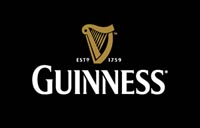
St. James's Gate Brewery is a brewery founded in 1759 in Dublin, Ireland, by Arthur Guinness. The company is now a part of Diageo, a company formed from the merger of Guinness and Grand Metropolitan in 1997. The main product of the brewery is Draught Guinness.
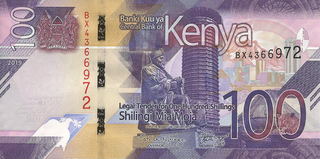
The shilling is the currency of Kenya. It is divided into 100 cents. The Central Bank of Kenya Act cap 491, mandated the printing and minting of the Kenyan shilling currency.

The Nairobi Securities Exchange (NSE) was established in 1954 as the Nairobi Stock Exchange, based in Nairobi the capital of Kenya. It was a voluntary association of stockbrokers in the European community registered under the Societies Act in British Kenya. The exchange had 66 listed companies in February 2021.

East African Breweries Limited, commonly referred to as EABL, is a Kenyan-based holding company that manufactures branded beer, spirits, and non-alcoholic beverages.

Corruption in the government of Kenya has a history which spans the era of the founding president Jomo Kenyatta, to Daniel arap Moi's KANU, Mwai Kibaki's PNU governments. President Uhuru Kenyatta's Jubilee Party government, and the current William Ruto's Kenya Kwanza administration has also been riddled with massive cases of graft, topping in the list of corrupt Presidents in Africa
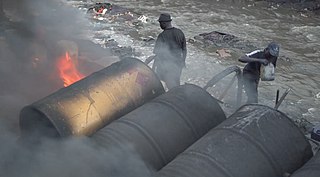
Changaa or Chang'aa is a traditional home-brewed spirit, popular in Kenya. It is made by fermentation and distillation from grains like millet, maize and sorghum, and is very potent.
Karnataka liquor deaths are deaths in Karnataka state in India in 1981 by consuming illegal liquor. In July 1981 about 308 people died in Bangalore by illicit liquor. Adulteration of cheap liquor by methyl alcohol resulted in deaths.
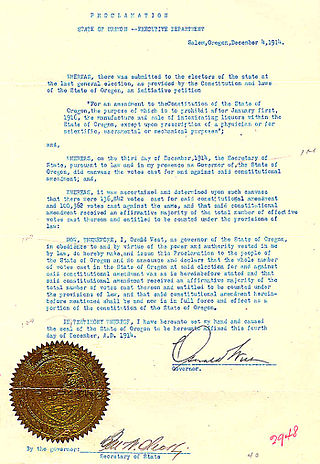
The U.S. state of Oregon has an extensive history of laws regulating the sale and consumption of alcoholic beverages, dating back to 1844. It has been an alcoholic beverage control state, with the Oregon Liquor and Cannabis Commission holding a monopoly over the sale of all distilled beverages, since Prohibition. Today, there are thriving industries producing beer, wine, and liquor in the state. Alcohol may be purchased between 7 a.m. and 2:30 a.m for consumption at the premise it was sold at, or between 6 a.m. and 2:30 a.m. if it is bought and taken off premise. In 2020, Oregon began allowing the sale of alcohol via home delivery services. As of 2007, consumption of spirits was on the rise while beer consumption held steady. That same year, 11% of beer sold in Oregon was brewed in-state, the highest figure in the United States.
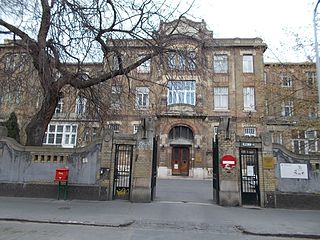
Although death rates have decreased in Hungary since 1985, life expectancy remains low by European standards, particularly among Romani people. Almost half the deaths are caused by cardiovascular disease. A tax on some high-sugar foods, introduced in 2011, has encountered opposition from the confectionery trade. Drinking remains a major health problem, while smoking prevalence has greatly decreased. Health, in general, is poorer in the southern and eastern parts of the country.
The Tegla Loroupe Peace Race is an annual 10-kilometre road running event which takes place in November in Kapenguria, West Pokot County, Kenya. First held in 2003, the race was created by Kenyan runner Tegla Loroupe to bring together warriors of rival tribes to reduce conflict in the region. The event features separate 10K races for elite long-distance runners and local warriors. There is also a race for children and a VIP race for politicians and dignitaries. The race raises funds for the Tegla Loroupe Peace Foundation, a charitable body focused education, sports and medical issues.
Sulai is a rectified spirit brewed in the Northeast Indian state of Assam. A clear, colourless alcohol, Sulai is known as tharra in north India, handia or pheni in Nepal, and referred to as country liquor in colloquial parlance. It is generally brewed from fermented molasses or occasionally rice.

Southern Sudan Beverages Limited was a brewery based in South Sudan and previously owned by ABInBev. The company closed operations in 2016.
Cholai is an illegal alcoholic beverage made in India, equivalent to "hooch" or "bootleg" alcohol. Usually made from rice, it is sometimes mixed with industrial alcohol or methanol, which has resulted in several hundred deaths.

Desi daru, also known as country liquor or Indian-made Indian liquor (IMIL), is a category of liquor made in the countryside of the Indian subcontinent. It is traditionally prepared by a procedure that has been passed down for centuries. Due to cheap prices, country liquor is the most popular alcoholic beverage among the impoverished people. It is fermented and distilled from molasses, a by-product of sugarcane. Desi liquor is a broad term and it can include both legally and illegally made local alcohol. The term desi daru usually refers to legal alcohol while other types of country liquor may be categorised as moonshine alcohol.
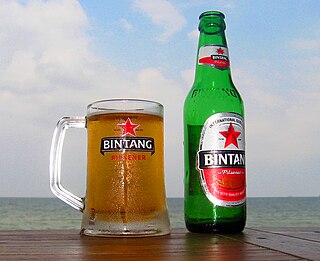
Alcohol in Indonesia refers to the alcohol industry, alcohol consumption and laws related to alcohol in the South East Asian country of Indonesia. Indonesia is a Muslim majority country, yet it is also a pluralist, democratic and secular nation. These social and demographic conditions led to Islamic parties and pressure groups pushing the government to restrict alcohol consumption and trade, while the government carefully considers the rights of non-Muslims and consenting adults to consume alcohol, and estimates the possible alcohol ban effects on Indonesian tourism and the economy.

Alcohol in Malaysia refers to the consumption, industry and laws of alcohol in the Southeast Asian country of Malaysia. Although Malaysia is a Muslim majority country, the country permits the selling of alcohol to non-Muslims. There are no nationwide alcohol bans being enforced in the country, with the exception of Kelantan and Terengganu which is only for Muslims. The Islamic party respects the rights of non-Muslims and non-Muslim establishments like Chinese restaurants and grocery shops are excluded from such bans. The federal territory of Kuala Lumpur has the highest alcohol consumption in the country, followed by the states of Sarawak in second place and Sabah in third place.











